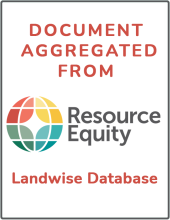Land Library Search
Through our robust search engine, you can search for any item of the over 73,000 highly curated resources in the Land Library.
If you would like to find an overview of what is possible, feel free to peruse the Search Guide.
/ library resources
Showing items 1 through 9 of 151.At the end of Apartheid, approximately 82 million hectares of commercial farmland (86% of total agricultural land, or 68% of the total surface area) was in the hands of the white minority (10.9% of the population), and concentrated in the hands of approximately 60,000 owners (Levin
Thinking about forest management has undergone important changes over the last two decades. These changes have inspired attention to the reform of forest laws on a range of subjects, from forest planning and utilization to governance and trade.
Rising poverty in rural Uganda is linked to increasing landlessness, as the latter drives land degradation and reduces agricultural productivity. This paper examines the complex relationship between owning land and poverty.
Possession of vast lands is a major representation of wealth in the Philippines - a privilege enjoyed largely by the ruling class since the colonial era. This ownership of huge tracts of land has resulted in numerous political, social, and economic inequalities.
Poverty in the Near East and North Africa region (NENA) is mainly a rural phenomenon. Almost half (48%) the area’s population lives in rural areas.
This paper analyses the livelihoods of the Borana pastoral communities of Southern Oromiya in Ethiopia. It aims to inform policy makers, donors, and development practitioners about the best strategies for protecting and promoting sustainable livelihoods in the region.
Secure access to resources is now recognised in human rights discourse as a universal condition of human well-being. This paper aims to contribute to the theoretical and empirical understanding of land tenure as a human rights issue, by analysing recent land tenure policy in South Africa.



